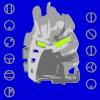
Since BIONICLE has ended (and by that I mean since 2010; G2 barely registered for me as an event), BIONICLE itself, the time from when I got my first set in 2003 to 2010, feels like my own personal "time before time." On one hand, it does feel like time existed as a BIONICLE fan, and even that BIONICLE is what made me aware of time. Before 2003 (when I was seven years old), my memories are emotional but do not take place in any particular order. After 2003, it feels much more structured, like each years builds up to the next. When someone says 2005, for example, even in a context related to a movie or something else from pop culture or current events, my first thought is Web of Shadows (along with Revenge of the Sith).
I do remember, post-2010, each year feeling much less meaningful or distinct. I had learned to almost need a new wave of BIONICLE sets and lore to feel like a year has properly passed, as weird as that is to admit. I still feel that way now. I do suppose that those years, from ages 7 to 14, it is probably normal to feel that way about the passage of time, I just find it interesting how perfectly it synced up with BIONICLE.
I recall from the MNOG behind-the-scenes documentary, the game designers knew that the kids into BIONICLE were not necessarily the popular kids, and that's why they chose the weirdos of each village (Taipu, the Onu-Matoran who liked sunlight; Tamaru, the Le-Matoran afraid of heights, etc.) to be the heroes of the day. In the case of characters like Kopeke, it feels sometimes like the Chronicler's Company was intentionally coded to be in some way neurodivergent, which might be why they resonated with us so much. Toa Matoro feels very similar, I always found it profound that he thought of himself and others too thought of him as "just a translator" before 2007.
I have heard people who weren't raised with BIONICLE say it's just plastic toys and give me a side eye for my huge collection, and I suppose from a strictly reductionist sense they are correct, but from watching videos like the first BIONICLE pitch video (on Christian Faber's YouTube channel Quest for Future Creativity) it really does seem to be that BIONICLE was crafted as if it were a legitimate form of genuine modern mythology as opposed to trinkets to keep kids occupied.
Perhaps it is only because I was an introspective child and feel somewhat cheated by public school and the world, but BIONICLE feels much more like it was building up to something gratifying than anything else that was going on during my upbringing. Maybe this is a common feeling, or maybe I am just losing it. I guess that is what I meant my BIONICLE being my own personal "time before time."
I've also been binging Code Lyoko lately, which might explain my wistful escapism. Maybe I will make another blog entry about that show, which is also a powerful source of nostalgia (though not as much as BIONICLE).
- Read more...
- 6 comments
- 153 views

